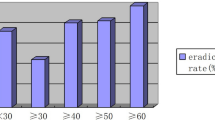Abstract
Omeprazole (20mg od/b.d.), clarithromycin (250mg b.d.) and tinidazole (500mg b.d. for 7 days) [OCT] is an effective regimen againstHelicobacter pylori. However, treatment fails in 5%–10% of patients and the reasons for this are not clear. We investigated patient factors that independently predicted failure of this regimen.H. pylori-positive patients were prescribed OCT and the success of treatment was evaluated by the13C-urea breath test at least 4 weeks after completion of therapy. Patients were prospectively interviewed on past medical history of peptic ulcer and H2-receptor antagonist (H2RA) pre-treatment, smoking history, and alcohol intake. Data were also collected on age, gender, and endoscopic diagnosis to determine factors predicting failure of OCT.H. pylori eradication was achieved in 238 of 273 patients [87%–95% confidence intervals (CI), 83%–91%]. Age, alcohol intake, past medical history of peptic ulcer and peptic ulcer at endoscopy were not independently associated with treatment failure.H. pylori eradication with OCT was less successful in women (P=0.02), in patients who had received H2RA pre-treatment (P=0.02), and in smokers (P=0.02) when evaluated by multiple logistic regression. These findings indicate that OCT is less effective in smokers and in patients who receive H2RA pre-treatment suggesting that these agents should be avoided, if possible, before the patient commences therapy.H. pylori eradication was less successful in women; this result needs further evaluation.
Similar content being viewed by others
References
Bazzoli F, Zagari RM, Fossi S, et al. Short-term low-dose triple therapy for the eradication ofHelicobacter pylori. Eur J Gastroenterol 1994;6:773–777.
Goddard A, Logan R. One-week low-dose triple therapy: New standards forHelicobacter pylori treatment. Eur J Gastroenterol 1995;7:1–3.
Logan RPH, Gummett PA, Misiewicz JJ, et al. One-week eradication regimen forHelicobacter pylori. Lancet 1991;338:1249–1252.
Bell GD, Powell K, Burridge SM, et al. Experience with “triple” anti-Helicobacter pylori eradication therapy: Side effects and the importance of testing pretreatment bacterial isolate for metronidazole resistance. Aliment Pharmacol Ther 1992;6:427–435.
Moayyedi P, Sahay P, Tompkins DS. Efficacy and optimum dose of omeprazole in new 1-week triple therapy regimen to eradicateHelicobacter pylori. Eur J Gastroenterol Hepatol 1995;7:835–840.
Graham DY, Lew GM, Malaty HM, et al. Factors influencing the eradication ofHelicobacter pylori with triple therapy. Gastroenterology 1992;102:493–496.
Labenz J, Stolte M, Ruhl GH, Becker T, et al. One-week low-dose triple therapy for the eradication ofHelicobacter pylori infection. Eur J Gastroenterol Hepatol 1995;7:9–11.
Labenz J, Leverkus F, Borsch G. Omeprazole plus amoxycillin for the cure ofHelicobacter pylori infection—factors influencing the treatment success. Scand J Gastroenterol 1994;29:1070–1075.
Logan RPH, Dill S, Bauer E, et al. The European13C-urea breath test for the detection ofHelicobacter pylori. Eur J Gastroenterol Hepatol 1991;3:915–921.
Unge P, Gad A, Eriksson K, et al. Amoxicillin added to omeprazole prevents relapse in the treatment of duodenal ulcer patients. Eur J Gastroenterol Hepatol 1993;5:325–331.
Witteman EM, Hopman WPM, Becx MCJM, et al. Short report: Smoking habits and the acquisition of metronidazole resistance in patients withHelicobacter pylori-related gastritis. Aliment Pharmacol Ther 1993;7:683–687.
Blair AJ, Feldman M, Barnett C, et al. Detailed comparison of basal and food-stimulated gastric acid secretion in normal subjects and patients with duodenal ulcer. J Clin Inv 1987;79:582–587.
Labenz J, Stolte M, Blum AL, et al. Intragastric acidity as a predictor of the success ofHelicobacter pylori eradication: A study in peptic ulcer patients with omeprazole and amoxicillin. Gut 1995;37:39–43.
Holm L, Perry MA. Role of blood flow in gastric acid secretion. Am J Physiol 1988;G281–G293.
Adamek RJ, Wegener M, Labenz J, et al. Medium-term results of oral and intravenous omeprazole/amoxicillinHelicobacter pylori eradication therapy. Am J Gastroenterol 1994;89:39–42.
Pullar T, Kumar S, Tindall H. Time to stop counting tablets? Clin Pharmacol Ther 1989;46:163–168.
Axon ATR. The role of acid inhibition in the treatment ofHelicobacter pylori infection. Scand J Gastroenterol 1994;29(Suppl 201):16–23.
Varhaug JE, Svanes K, Lekven J. Regional gastric blood flow and acid secretion during histamine H2-receptor blockade in cats. Scand J Gastroenterol 1983;18:977–986.
Holm-Rutili L. Effects of omeprazole on gastric micro-circulation in the rat. Gastroenterology 1987;92:716–723.
Polansky DB, Shirazi SS, Coon D. Lack of correlation of gastric acid secretion and blood flow. J Surg Res 1979;26:320–325.
Kauffman GL, Aures D, Grossman MI. Intravenous indomethacin and aspirin reduce basal gastric mucosal blood flow. Am J Physiol 1980;238:G131-G138.
Prewett EJ, Smith JTL, Nwokolo CU, et al. Twenty-four hour intragastric acidity and plasma gastrin concentration profiles in female and male subjects. Clin Sci 1991;80:619–624.
Bode G, Mauch F, Malfertheiner P. The coccoid forms ofHelicobacter pylori. Criteria for their viability. Epidemiol Infect 1993;111:483–490.
Author information
Authors and Affiliations
Rights and permissions
About this article
Cite this article
Moayyedi, P., Chalmers, D.M. & Axon, A.T.R. Patient factors that predict failure of omeprazole, clarithromycin, and tinidazole to eradicateHelicobacter pylori . J Gastroenterol 32, 24–27 (1997). https://doi.org/10.1007/BF01213292
Received:
Accepted:
Issue Date:
DOI: https://doi.org/10.1007/BF01213292




